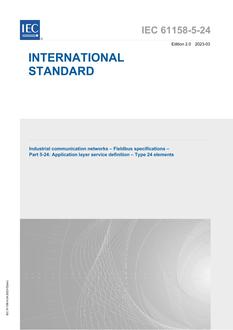
The fieldbus application layer (FAL) provides user programs with a means to access the fieldbus communication environment. In this respect, the FAL can be viewed as a “window between corresponding application programs.”
This document provides common elements for basic time-critical and non-time-critical messaging communications between application programs in an automation environment and material specific to Type 24 fieldbus. The term “time-critical” is used to represent the presence of a time-window, within which one or more specified actions are required to be completed with some defined level of certainty. Failure to complete specified actions within the time window risks failure of the applications requesting the actions, with attendant risk to equipment, plant and possibly human life.
This document defines in an abstract way the externally visible service provided by the different Types of fieldbus Application Layer in terms of
• an abstract model for defining application resources (objects) capable of being manipulated by users via the use of the FAL service,
• the primitive actions and events of the service,
• the parameters associated with each primitive action and event, and the form which they take, and
• the interrelationship between these actions and events, and their valid sequences.
The purpose of this International Standard is to define the services provided to
• the FAL user at the boundary between the user and the Application Layer of the Fieldbus Reference Model, and
• Systems Management at the boundary between the Application Layer and Systems Management of the Fieldbus Reference Model.
This document specifies the structure and services of the IEC fieldbus Application Layer, in conformance with the OSI Basic Reference Model (ISO/IEC 7498-1) and the OSI Application Layer Structure (ISO/IEC 9545).
FAL services and protocols are provided by FAL application-entities (AE) contained within the application processes. The FAL AE is composed of a set of object-oriented Application Service Elements (ASEs) and a Layer Management Entity (LME) that manages the AE. The ASEs provide communication services that operate on a set of related application process object (APO) classes. One of the FAL ASEs is a management ASE that provides a common set of services for the management of the instances of FAL classes.
Product Details
- Edition:
- 2.0
- Published:
- 03/01/2023
- ISBN(s):
- 9782832265802
- Number of Pages:
- 106
- File Size:
- 1 file , 1.8 MB
- Note:
- This product is unavailable in Ukraine, Russia, Belarus